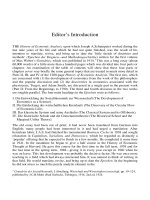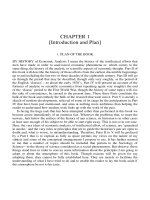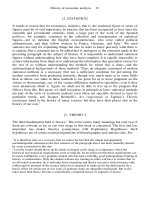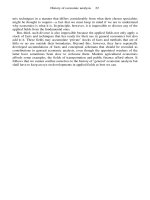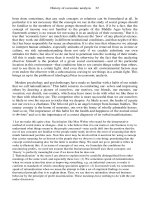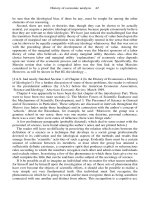History of Economic Analysis part 3 potx
Bạn đang xem bản rút gọn của tài liệu. Xem và tải ngay bản đầy đủ của tài liệu tại đây (57.54 KB, 10 trang )
based as it was on a sophisticated Continental Catholicism, not only left Robbins cold,
but clearly he paid no attention to it.
In general, Robbins thought that Schumpeter’s bias against classical economics
reflected the feelings of someone outside the ‘true’ Utilitarian tradition. Robbins wrote
that Schumpeter’s perception of the influence of Bentham’s and James Mills’
Utilitarianism was distorted; most English writers were more balanced in their
assumptions of the meaning and consequence of that doctrine.
However, it is when Robbins sets out to demolish Schumpeter’s scaler system of hero
ratings that he scores his truest hits. Robbins’s approach is to attack first the textual
validity of Schumpeter’s assertions (1) of Smith’s place in the scheme of things, (2) of
Ricardo’s influence, (3) of Cournot’s analytical skills, and (4) of Marshall’s writings and
influence, and second to demonstrate that Schumpeter’s treatment of Walras was biased
in the other direction. Schumpeter, according to Robbins, clearly did not apply the same
rigor in assessing Walras as he did elsewhere (Robbins 1955, pp. 4–5).
Clearly what Robbins dismissed was the basic Schumpeterian schema, which
separated what went earlier from the economics of the British classical school-giving to
the former the split between real philosopher/theologians and mere pamphleteers. The
main casualty was Adam Smith’s reputation: put against such philosopher/theologians as
Plato, Aristotle, and Aquinas, Smith becomes a small potato. Schumpeter’s implication
(never really stated) that Ricardo had a good bit of the pamphleteer in his writings, tended
further to denigrate his opinion of the majesty of the British contribution. But it would be
an error to conclude that the thoughtful Robbins was unimpressed with what Schumpeter
had to say in 400 pages about the classical British tradition.
Robbins lauded Schumpeter’s treatment of economics since 1870, but noted rather
trenchantly that in contrast to Schumpeter’s rule, individual writers, not the schools of
thought, are what is to be judged. It is in this sense that Robbins thought that Schumpeter
clearly underrated Marshall and treated a supposed neglect by Marshall of Jevons, of von
Thünen, and of Cournot and Dupuit with scorn. He thought that Schumpeter’s treatment
of Walras was designed so as to protect both himself and Walras from criticisms that
Edgeworth and Marshall were Walras’s betters both with regard to vision and to technical
detail.
26
While Robbins chose to end his essay with a pastoral reminiscence of his last meeting
with Schumpeter, the important thing is the thrust of an Englishman against someone
who may have been an Anglophile in his youth (prior to World War I), but who was very
different in his maturity and old age.
27
26 Later, when Lionel Robbins (1955) was to suggest that he disputed Schumpeter’s ranking
Walras ahead of Ricardo, I think that Lord Robbins missed the underlying point. Ricardo’s
substance was based squarely on a Benthamite pedestal displaying at best only one limited aspect
of human frailty-cum-choice, while Walras’s substance was based on the greater foundation of
mathematical logic and the Cartesian perception of cosmic system.
27 The pastoral reference is to the last time when Schumpeter and Robbins met; it was ‘a lovely
day in June [in the middle 1930s]…and, as we glided down the Thames between Twickenham and
Datchet, I can still see him, cheerfully ensconced in the prow of our ship, surrounded by the eager
spirits of the day, Nicky Kaldor, Abba Lerner, Victor Edelberg, Ursala Hicks-Webb, as she then
was, the master-organizer of the party-the four fingers and the thumb of each hand pressed against
those of the other, discoursing with urbanity and wit on theorems and personalities’ (p. 22).
Somewhat later on, Mark Blaug was to put this line of criticism in a different way, but
with much more precision and clearly more bite. In his authoritative statement-cum-
textbook (1962, etc.), Blaug takes most of Schumpeter’s assertions about what he set out
to do and then measures them against what he actually did. Of course, it was the same
with Schumpeter as with many others: the reach was greater than the grasp. Most
importantly, Blaug struck at Schumpeter’s belief that ideology could be separated from
science. But Blaug’s blow, unlike Ronald Meek’s (to which we will come shortly), was
not aimed with the view that one’s directions are shaped by one’s environment; rather,
where Schumpeter asserted that in the making of theory, particularly when it dealt with
statistical factual observation, one could strip from the science one’s ideological
commitments, Blaug asserts that the stripping occurs when one sees the results of the true
scientific applications only after testing the constructs under differing conditions. Blaug,
something of a Popperian, is also something of a logician; and between the two, Blaug
fashions his measuring rod. Blaug, like Schumpeter, does not suffer from observable
doubt; nonetheless, in my judgement, he offers, scattered throughout his book, the most
penetrating, detailed analyses of Schumpeter’s treatise.
4.4 Another critical attack came, as one might expect, from the Marxian corner, in the
person of Ronald Meek. Published in the Scottish Journal of Political Economy in 1957,
Meek’s essay, ‘Is Economics Biased? A Heretical View of a Leading Thesis in
Schumpeter’s History,’ attacks frontally Schumpeter’s problem of separating science and
ideology, and in so doing turns to the thorny issue of whether the filiation of ideas
invariably leads to progress. Meek understands Schumpeter’s fascination with Marxism,
but insists that it was so endowed with a visceral distaste for Marx that Schumpeter was
rendered unreliable in making his judgements. Marx had argued that economics was
making scientific progress until the 1830s and then went off on a bourgeois kick.
Marxians argue, writes Meek, that during the Patristic-Scholastic phase the writings
tended to identify what prices ought to be; during the Neo-Scholastic-Mercantilist phase
the writings tended to explain why things sold at the prices they did, and in the classical
stage the writings tended to identify the competitive equilibrium and the amount of labor
power consumed in the manufacture of goods. Schumpeter, by contrast, thought that the
Patristic-Scholastic writers had developed a theory of utility and scarcity. What emerged
afterwards contained much side-tracking as well as clear error.
Meek’s argument is most clearly appreciated when it comes to consideration of
marginal analysis, something which Schumpeter thought was real science and
ideologically neutral. Meek thinks that marginal analysis reflects the nexus between men
(the producers) and goods, whereas the earlier classical analysis reflected the nexus
between men (the workers) and the owners. Consequently, there was no great advance
with the advent of marginal analysis; if anything, it led to the examination of things other
than what was important—namely social relationships and the production process.
4.5 Having thus laid out several lines of criticism of Schumpeter’s book, let me turn to
one of the more masterful reviews, that of Jacob Viner which stresses the virtues of the
work:
It is when Schumpeter is dealing with authors whose analytical quality he
rates highly and whose economic analysis constituted a complex and
coordinated system that he rises to his highest level in his book. His
reports of these systems are magnificent feats of summarization. In
outlining the analytical framework of these systems, moreover, he brings
clearly into the light the fullness of their achievement and enables us to
read these authors henceforth with deeper understanding and appreciation.
It is the substantial portions of the book which he devotes to exposition,
appraisal, and praise of the economic analysis of Cantillon, Quesnay,
Marx, Jevons, Menger and Böhm-Bawerk, Cournot, and Walras—and less
enthusiastically, Adam Smith, Marshall, and Fisher—which constitute its
most valuable contribution. Nowhere else, I think, in the literature of our
discipline, can one find, within comparable limitations of space, as
brilliant, and as self-effacing, exposition by one economist, himself a
master, of the analytical achievements of other economists.
(p. 899, emphasis added).
The foregoing is not presented as though Viner did not have major disagreements, which
are presented logically and comprehensively. I still find Viner’s case against
Schumpeter’s treatment of Ricardo the best yet.
4.6 Limitations of space preclude any more than the merest reference to O.H. Taylor’s
(Schumpeter’s colleague who regularly had taught the History of Economic Thought at
Harvard) generally laudatory review in the Review of Economics and Statistics, or
G.B.Richardson’s critical and laudatory essay in the Oxford Economic Papers, or of a
1956 general review essay (containing other books as well) by V.W.Bladen in the
Canadian Journal of Economics and Political Science.
I am left, however, to report just one additional criticism, to be found in Arnold
Heertje’s biography of Schumpeter in The New Palgrave.
Reading Schumpeter, one realizes that his lasting significance stems from
historical description and non-mathematical theoretical analysis. His
inability to put his ideas about the development of economic life into a
mathematical form may eventually change our assessment of him. But
whatever the final evaluation of Schumpeter may be, it cannot be denied
that he gave new direction to the development of economic science by
posing some entirely new questions. Schumpeter’s preoccupation with the
dynamics of economic life broke the spell of the static approach to
economic problems.
Throughout his life Schumpeter was an enfant terrible, who was
always ready to take extreme positions for the sake of argument, and often
seized the chance to irritate people. But he was also a giant on whose
shoulders many later scholars contributing to economic science stood. As
an economist he is no longer in the shadow of Keynes, but in the centre of
the economic scene, both in the theoretical and empirical sense.
(Heertje, 1987, at p. 266).
V MY ASSESSMENT OF THE BOOK
5.1 What is outstanding in this work in my estimation is first the scope of Schumpeter’s
vision and secondly the evidence of breadth of execution. I believe that since its
publication, two, perhaps three, other books offering a vision of comparable (but not
necessarily of equal) scope have appeared. They are works by Ben B.Seligman (1962),
Wesley Clair Mitchell (1967, 1969), and Karl Pribram (1983). The latter two were also
published posthumously, but the material they were based upon was more complete than
was the case here.
5.2 The Seligman book studies the history of economics from the standpoint of an
increasing emphasis on analytical (meaning generally geometric and algebraic)
technique. As a study, I think it reflects a dismay (perhaps even a disillusionment) about
the directions that economics has taken, particularly since the dominant influence of Paul
A.Samuelson’s 1947 The Foundations of Economic Analysis. It is a readable book, but its
vision is narrowly reactive, and I think that the mere mention of it suffices for our
purposes.
5.3 The Mitchell study, Types of Economic Theory: From Mercantilism to
Institutionalism, on the other hand, is magisterial. In its form it is a well-revised transcript
of a student’s shorthand transcription of several sets of Mitchell’s lecture notes by Joseph
Dorfman, the noted historian of American economics.
28
Mitchell’s approach, reduced
here almost to the point of triviality, is an interpretation of how economic thinking
mirrored society’s adaptation principally to the phenomena of modern (post-Industrial
Revolution) industrialization and modern industrialized urban life.
29
Economic theory, in
Mitchell’s mature and considered judgement, was essentially a set of somewhat
idiosyncratic explanations by a group of bright economists seeking to explain in terms
familiar to themselves empirical phenomena associated with the aforementioned social
processes. In common with Schumpeter, Mitchell thought theory was about meanings,
usually of observable phenomena.
5.4 I believe that Pribram’s book, A History of Economic Reasoning, is another
example of a magisterial interpretation. Pribram’s approach, also reduced to something
28
I have not included any discussion of Dorfman’s five-volume encyclopedic masterpiece, The
Economic Mind in American Civilization, principally because it deals only with the evolution of
thought within a geographically determined framework. Nonetheless, it serves as the prototypical
factual summary of the evolution of the discipline.
29
Mitchell, himself, did not focus consciously on the process of modern urbanization, but I believe
that a sophisticated reading of what he covered also included that phenomenon, even if not
consciously articulated.
approaching triviality, is that from the time of Plato until the present, economics, as a
type of thinking, has sought to harmonize two quite opposing methods, a priorism and
empiricism. Such was the problem faced by Aristotle in contemplating Plato’s essences;
such was the problem faced by the Franciscan, Roger Bacon,
30
in facing the Dominicans
and what later became the Cartesian influence; such was the division between the 19th-
century Kantians and the Hegelians, the division between the Communists and the
Fascists during the 1930s, and such has been the division between the internationalists
(the American post-World War II Free Traders) and the ‘autarkic nationalists’ (meaning
the Keynesian-influenced British).
5.5 What Schumpeter offered in the History of Economic Analysis, again reduced to
something almost approaching triviality, is the view that understanding economic
phenomena, after abstracting what one understood from ideological preferences, depends
in large part on the epistemological methods one employs, but that each of these methods
has its own historico-sociological experience. He came, particularly in his later years, to
the view that one has to appreciate the way that what one borrows affects whatever one
has. As I interpret this point my example is that in employing the calculus, economists
borrowed a method originally designed for physical mechanics, and that the physics
discipline’s fascination with explaining the equilibrium of forces was translated in
economics into a fascination with a static equilibrium, not at all suited for a process
which was essentially biological, organic, and ever-mutating.
31
When Schumpeter wrote
of dynamic general equilibrium he had in mind something quite different from a
‘Newtonian’-Golden Fleece. Pribram, also educated at the University of Vienna (he was
von Wieser’s principal assistant), like Schumpeter expressed the view that British and
American economics was seriously constrained by the influence of Benthamite
utilitarianism.
5.6 I come now to my own principal criticism of what Schumpeter offered us, namely his
vision. Blaug’s careful reading of what Schumpeter promised and what he delivered
shows that they were not the same. Query, if one is the more important than the other, is
the delivery necessarily the basis for the ultimate assessment? If so, then one does not
understand the unique place of visions. But, will any dream do? Not likely! What sets
Schumpeter’s dream above the others’ is the multiplicity and complexities of its parts.
But, assuming that Schumpeter sought to offer a vision, how can his vision be judged?
Hayek, in some senses a product of the same Viennese Gymnasium-mold which produced
Schumpeter, offers the beginnings of an interesting comparison and ultimate criticism.
30
Perhaps because I am better versed in English secular literature than I am in Latin theological
literature, I prefer as the prototype not Roger Bacon (1214–94) but Francis Bacon (1561–1626).
31
There are several ways of viewing the process of looking for equilibrium. One, the Newtonian, is
determinate: if Jupiter wobbles, one can ultimately not only figure out why, but should be able to
confirm the source through cognition (albeit with a better telescope). The second one, which can be
termed agricultural, postulates that by controlling the inputs, the outpt can be determined within
limits (e.g. change the temperature, and the tomatoes will come to market sooner or later). The third
approach, the Shackelian, suggests that there is no way to determine equilibrium; in the struggle
between well-matched adversaries there is no way to predict whether there will be an outcome,
much less what it involves.
Hayek came to embrace the complex paradigm of individualism-utilitarianism.
Accordingly, had he written of Schumpeter’s vision, he probably would have said (no
doubt politely) that Schumpeter had it wrong.
But Hayek’s enthusiasm for the individualism-utilitarianism paradigm, emphasizing in
his economics the centrality of Mandeville (Hayek, 1967a), Smith, J.S.Mill and personal
liberty, brings to my mind the question of various possible alternative paradigms. I
mention but three: the centrality of scarcity, the centrality of uncertainty, and the
centrality of essential (i.e. stable) moral imperatives (i.e. values).
As we have seen, Schumpeter rejected the paradigm of individualism-utilitarianism
(and personal liberty). He did not seriously consider the paradigm of uncertainty. But, in
the absence of any other specification, it seems to me he was groping for some paradigm
of fundamental social morality. He was easily sidetracked, and spent too much effort
decrying ideology (although he never decried theology).
Ronald Meek noted in his Marxian interpretation that prior to the classical tradition,
economics dealt with social (by which I suspect he might have meant stable imperatives)
issues
32
like the relationship between workers and their lords. He went on to say that
during the classical period that paradigmatic interest shifted away from a historically
appropriate discussion about classes, people and social organization to an historically
inappropriate nexus between producers and goods. My suggestion is that the vision that
Schumpeter really sought was one involving something akin to a theological paradigm—
integrating fundamental, non-changing, ethical and social values and the dynamic
workings of an evolutionary economy.
By fundamental human and social values, I mean an absolute, true system which was
exogenous to time and place. It was for this reason that so much of Schumpeter’s interest
focussed on medieval writers and Natural Law, but his own remarriage after his divorce
alienated him from the religion of his ancestors. Loring Allen asserts that while
Schumpeter seemed to believe that conventional religious beliefs were for mortals lesser
than he, he became increasingly mystical as he grew older—to the point of writing to and
talking with his dead mother and his dead second wife (Allen, 1991, I, pp. 223–7; II 58–
9). My own assessment differs from Allen’s, who like many modern scientists offer their
discussions and judgements of concepts of religion and religiosity on narrow, somewhat
formalistic and institutionalized planes. Schumpeter, in my view, had a strong religious
nature, albeit one not categorized among the ‘going-organized’ religions. His second
marriage after a divorce may have put him outside of the Roman Catholic flock, but his
devotion to the souls of his dead mother and second wife are considerable evidence that
something of his earlier religious conditioning remained.
When he was a younger man he had thought of science as furnishing answers covering
all topics. By the time he had gotten to this work, he had less faith in science (note his
bow to Hayek’s crusade against Scientism: Schumpeter 1954, p. 17), replacing it with an
interest in historical sociology. My point is simply that his sense of vision, great by
comparative standards, was nonetheless admittedly incomplete. On the one hand there
was from his religiosity a sense of timeless all-encompassing truth which included but
transcended science, for science was the name given to marvelous sets of analytical tools,
32
Within a dialectical stream, of course.
when perfected perhaps also timeless in nature, but certainly never as grand as the
basic vision itself. On the other, there was historical sociology, which gave a system to
the bodies of material, including methods of exposition, relating to ever-changing
societies.
I think there was genius in Schumpeter’s linkage of science and greater truth, but he
knew of a flaw as well. He was aware that scientific advance in one area not only could
be translated to work in other areas, but that in the process mor was transferred than
merely the scientific method. The original area had its own Gestalt, and the transference
often brought along pieces of that original Gestalt, which could be essentially alien to the
new area. Newton, one of the inventors of the calculus, was a physicist interested in
mechanics and therefore concerned with equilibrium. Economists, appreciating the
potential of the calculus, often were unaware that they were applying a physics-derived
technique to a socio-biological type discipline, where the one important truth was not
equilibrium but constant mutation.
33
Thus, I conclude that Schumpeter wanted a vision which embraced and bound
together the permanent and exogenous with the sociological-transitory and indigenous,
and he failed to find it. Had he chosen to build on the American Institutionalist writers
like Commons and Mitchell as exemplars of the sociological-transitory with their
inability to find the timeless truth, he could have shown the dilemma from the non-
‘theoretical’ side.
34
Unlike many of the theorists of his time, Schumpeter expressed some,
if limited, respect for what they were trying to do; but, he did not go on to say what
should have been said: (a) that they did not see beyond the Hobbes-Locke individualist-
utilitarian paradigm, and (b) that their ignorance of Pareto’s work on non-rational
systems made their work far more barren theoretically than it should have been.
Perhaps had Schumpeter lived longer, he might have tidied up his presentation. But, as
it was published, it is that incompleteness of his vision, rather than Blaug’s ‘inadequate-
delivery’ criticisms, which is the critical one. Like many Old Testament figures,
Schumpeter was magnificent, but flawed; like them, he had a great vision, but only of
less than perfect proportions. As with Einstein, Schumpeter failed to find his unified
theory, but like Einstein he believed that there must be one somewhere.
I once described the Schumpeter, Mitchell and Pribram treatments thus:
33
This is Perlman’s example, not Schumpeter’s. But, I have found it pedagogically useful when
explaining how Schumpeter’s broader vision as put forth in Part I of the HEA went beyond the
earlier lesser vision found in EDM.
34
Schumpeter’s neglect of the American Institutionalists may have had any number of causes: (1)
His department at Harvard was divided between the ‘mid-westerners’ and the ‘Europeans.’ He was
a principal among the latter, and his Harvard ‘mid-western’ colleagues were, by and large,
Institutionalists. (2) Part of the ‘in-snobbery’ or ‘intellectually-correct’ professional posturing of
that and many other periods was to deprecate sociology and historico-political analysis. (3) He
might have gotten around to this material had he lived longer. (4) Not having read the material in
detail or having had the time to integrate it (the Institutional writers were poor at integration),
Schumpeter concluded (I would say erroneously) that the American Institutional analysis was likely
provincial or perhaps, if one wanted to be generous, pretty much limited to societies embracing the
Utilitarian paradigm.
It is said of Franz Liszt and Arthur Rubenstein, both concert pianists of
the greatest distinction, that ‘they often missed some of the notes.’ Thus,
one can be authoritative without always being accurate…. To be
magisterial is to be authoritative, and each [of the three authors,
Schumpeter, Mitchell, and Pribram] achieves magisterial status because of
the distinctive and comprehensive originality of…perception of
intellectual evolution, rather than of chronological scope, accuracy, even
polish.
(Perlman, 1986, p. 9)
Schumpeter’s was the bravest of those visions; the most comprehensive of those dreams.
Why? Because, as Robbins and virtually everyone else wrote, Schumpeter had read
more, more widely, and more imaginatively than had any of the others. In the words of
Viner:
This is a book written in the polymath manner by perhaps the last of the
great polymaths. …Schumpeter did possess learning and skills manifestly
exceeding in range those displayed by any other economist of his or our
time, and that in this book he applied these endowments to the
enlightenment of his readers with a brilliance and a virtuosity which
excite and dazzle even when they fail wholly to persuade.
(1954, p. 894)
References
Augello, Massimo M. (1990). Joseph Alois Schumpeter: A Reference Guide. Berlin: Springer-
Verlag.
Allen, Robert Loring (1991). Opening Doors: The Life and Work of Joseph Schumpeter. New
Brunswick, NJ: Transaction Publishers.
Bladen, V.W. (1956). ‘Schumpeter’s History of Economic Analysis and some Related Books.’
Canadian Journal of Economics and Political Science, 22, 103–15.
Blanqui, Jérôme-Adolphe (1838). Histoire de l’Économie Politique en Europe.
Blaug, Mark (1985). Economic Theory in Retrospect, fourth edition. New York and Cambridge:
Cambridge University Press. The earlier editions were published by Irwin in 1962 and 1968,
and by Cambridge University Press in 1978.
Cossa, Luigi (1875). Guido allo Studio dell’Economia Politica A second edition, first published in
English as An Introduction to the Study of Political Economy with a Preface by William Stanley
Jevons in 1876.
Dorfman, Joseph (1946–49). The Economic Mind in American Civilization. In five volumes. New
York: Viking.
Dühring, Eugen Karl (1871). Kritische Geschichte der Nationalökonomie und der Sozialismus.
Gide, Charles and Charles Rist (1948). A History of Economic Doctrines from the Time of the
Physiocrats until the Present Day.
Gray, Alexander (1931). The Development of Economic Doctrine: An Introductory Survey.
London: Longmans, Green.
Haberler, Gottfried (1951). ‘Joseph Alois Schumpeter, 1883–1950,’ Quarterly Journal of
Economics, 64, 333–72.
——(1993). The Liberal Economic Order. Edited by Anthony Y.C.Koo.Aldershot, Hants, United
Kingdom: Edward Elgar.
Harris, Seymour Edwin, (ed.) (1951). Schumpeter, Social Scientist. Cambridge, MA: Harvard
University.
Hayek, Friedrich (1967a). ‘Dr Bernard Mandeville,’ Proceedings of the British Academy, pp. 125–
41.
——(1967b). Review of Joseph A.Schumpeter’s History of Economic Analysis, in Studies in
Philosophy, Politics, and Economics, Chicago: University of Chicago Press. This is an abridged
version of what had appeared in the Freeman in 1954.
Heertje, Arnold (1987). The New Palgrave, vol. 4, pp. 263–6.
Kautz, Gyula (1860). Die Geschichtliche Entwicklung der Nationalökonomie und Ihrer Literatur.
Knight, Frank H. (1954). ‘Schumpeter’s History of Economics.’ Southern Journal of Economics,
21, 261–72.
Little, I.M.D. (1955). ‘Essays in Bibliography and Criticism XXXI. History of Economic
Analysis.’ Economic History Review: Series 2, 10, 91–8.
Marx, Karl (1867). Das Kapital.
März, Edward (1991). Schumpeter: Scholar, Teacher, and Politician. New Haven, CT: Yale
University Press.
McCulloch, John Ramsay (1845). The Literature of Political Economy: A Classified Catalogue:
Select publication in the different departments of that science with historical, critical, and
bibliographical notes. London: Longman, Brown, Green, and Longmans.
Meek, Ronald (1957). ‘Is Economics Biased? A Heretical View of a Leading Thesis in
Schumpeter’s History.’ Scottish Journal of Political Economy, 1–17.
Mitchell, Wesley Clair (1949). ‘Lecture Notes on Types of Economic Theory: From Mercantilism
to Institutionalism.’ Sold by Augustus Kelley, Bookseller, New York.
——(1967 and 1969). Types of Economic Theory: From Mercantilism to Institutionalism. Edited
with an Introduction by Joseph Dorfman. New York: Kelley.
Perlman, Mark (1982) ‘Schumpeter as a Historian of Economic Thought,’ in Helmut Frisch (ed.),
Schumpeterian Economics, Eastbourne, East Sussex, England: Praeger, 1981, pp. 143–61.
——(1986). ‘Perceptions of Our Discipline: Three Magisterial Interpretations of the History of
Economic Thought.’ History of Economics Society Bulletin, Winter Issue, pp. 9–28.
——(1990). ‘Die Bienen-Fabel: Eine moderne Würdigung,’ in von Hayek, Friedrich A., Perlman,
Mark, and Kaye, Frederick B. Bernard de Mandevilles Leben und Werk. Düsseldorf:
Verlagsgruppe Handelsblatt.
Pribram, Karl (1993). A History of Economic Reasoning. Baltimore: Johns Hopkins University
Press.
Richardson, G.B. (1955). ‘Schumpeter’s History of Economic Analysis.’ Oxford Economic Papers
7, 136–50.
Robbins, Lionel (1955). ‘Schumpeter’s History of Economic Analysis.’ Quarterly Journal of
Economics, 44, 1–22.
Roll, Eric (Lord Roll of Ipsden) (1938). A History of Economic Thought. London: Faber and Faber.
Roscher, Wilhelm Georg Friedrich (1851). Geschichte der Englishen Volkswirtshaftslehre.
——(1874). Geschichte der Nationalökonomie in Deutschland.
Samuelson, Paul A. (1947). Foundations of Economic Analysis. Cambridge: Harvard University
Press.
Schumpeter, Joseph A. (1908). Das Wesen und der Hauptinhalt der theoretischen National-
ökonomie (The Nature and Essence of Theoretical Economics). Munich and Leipzig (Duncker
& Humblot).
——(1912
35
). Theorie der wirtschaftlichen Entwicklung (The Theory of Economic Development).
Leipzig: Duncker & Humblot. There is an English translation by Redvers Opie of the second
(1926) revised edition: The Theory of Economic Development: An Inquiry into Profits, Capital,
Credit, Interest, and the Business Cycle. Cambridge: Harvard University Press, 1934.
——(1914). Epochen der Dogmen- und Methodengeschichte. Tübingen: J.C.B.Mohr. There is an
English translation by R.Aris: Economic Doctrine and Method: An Historical Sketch. New
York: Oxford University Press, 1954.
——(1939). Business Cycles: A Theoretical and Statistical Analysis of the Capitalist Process, in
two volumes. New York: McGraw-Hill.
——(1942). Capitalism, Socialism, and Democracy. New York: Harper.
——(1949). ‘Science and Ideology,’ American Economic Review, 39, 345–59.
——(1951). Ten Great Economists from Marx to Keynes. New York: Oxford University Press.
——(1954). History of Economic Analysis. New York: Oxford University Press.
Spiegel, Henry (1971). The Growth of Economic Thought. Durham, NC: Duke University Press.
35
Swedberg (1991, p. 240) reports that the book actually appeared in 1911.
Swedberg, Richard (1991). Schumpeter: A Biography. Princeton: Princeton University Press.
Stark, W. (1959). ‘The “Classical Situation” in Political Economy.’ Kyklos, 12, 57–65.
Stigler, George J. (1954). ‘Schumpeter’s History of Economic Analysis.’ Journal of Political
Economy, 82, 344–5.
Taylor, O.H. (1955). ‘Schumpeter’s History of Economic Analysis.’ Review of Economics and
Statistics, 37, 12–21.
Viner, Jacob (1954). ‘Schumpeter’s History of Economic Analysis: A Review Article.’ American
Economic Review 44, 894–910.



